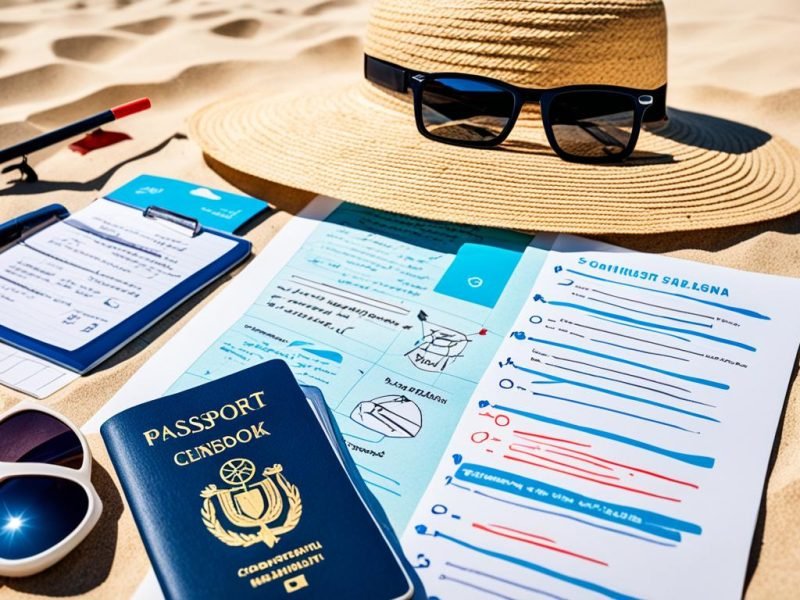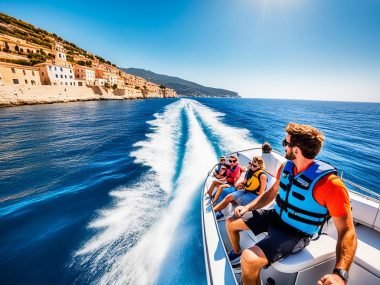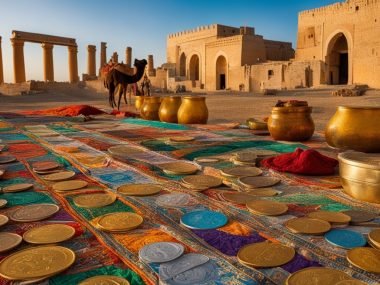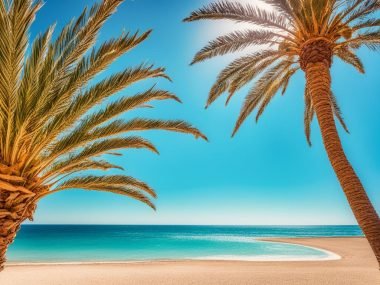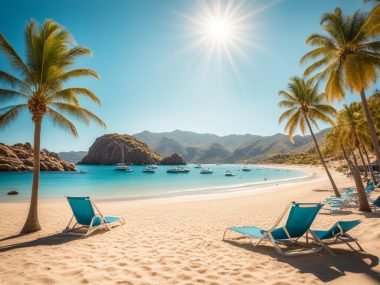Did you know Tunisia has nine UNESCO World Heritage sites? Sites like the ancient city of Carthage and Tunis’s medina are there. Despite being small, Tunisia is filled with history and beautiful places. Knowing a few things before you go will help a lot.
Tunisia has green areas up north and the Sahara Desert in the south. It’s so diverse! Before you go, learn about the people, the weather, and what papers you need. Tunisia mostly uses cash, not cards. Security tips from the Foreign, Commonwealth & Development Office (FCDO) are also key. They tell you where it’s safe to go.
Key Takeaways
- Tunisia boasts nine UNESCO World Heritage sites.
- The country is geographically and culturally diverse, spanning from lush northern regions to the Sahara Desert.
- Understanding local customs and weather patterns before your trip is crucial.
- Tunisia operates predominantly on cash, so it’s essential to carry sufficient money.
- Be aware of FCDO safety advisories that may affect travel plans and insurance.
Understanding Tunisia’s Regional Risks
Planning a trip to Tunisia means knowing the risks of certain areas. The Foreign, Commonwealth & Development Office (FCDO) has travel advice. It shows areas with more risks. Their advice can help make your visit better. Let’s look at which areas to avoid and safe places instead.
Areas to Avoid
The FCDO warns not to go to parts of Western Tunisia, near Algeria. The Chaambi Mountains National Park is risky due to terrorism and military actions. The south near Libya is also dangerous because of security issues.
Safer Alternatives
To have fun safely, steer clear of dangerous areas. Choose safer spots in Tunisia instead. Keeping up with FCDO advice helps you stay safe. It also keeps your travel insurance valid. Try cities by the coast and central areas for lower risks and better safety.
Entry Requirements and Visa Information
Before you plan your trip, know about Tunisia’s visa needs. Tourists from 95 countries, like the USA and the UK, can enter Tunisia without a visa for up to 90 days. You might need to show a ticket for your return or next trip, but not always.
A valid passport is key for entering Tunisia. Make sure your passport is valid for six months after you plan to leave. This helps you avoid issues at the border.
If you need a visa, get it before your trip. Contact your local Tunisian embassy or consulate and fill out the forms. You may also have to go for an interview. Check the embassy’s website for the latest on applying for a visa.
Being ready and informed means a smooth and easy entry into Tunisia. Below is a table summarising visa needs based on where you’re from.
| Country | Visa Requirement | Duration |
|---|---|---|
| United Kingdom | Not Required | Up to 90 days |
| United States | Not Required | Up to 90 days |
| Canada | Required | Varies |
| Germany | Not Required | Up to 90 days |
| Australia | Required | Varies |
Essential Tunisia Travel Tips
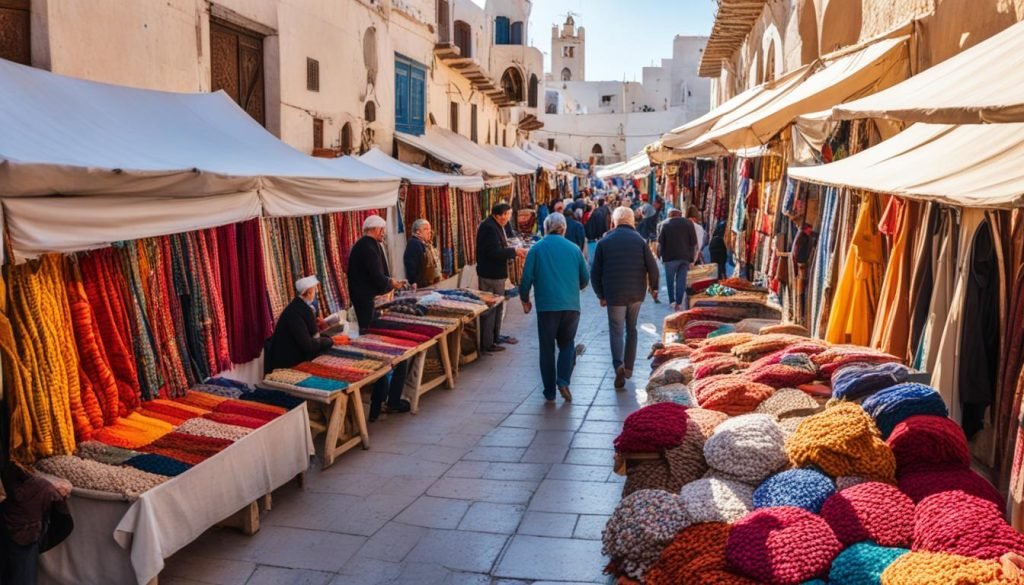
Getting ready for a Tunisia trip is exciting. Here are some important travel tips. They will help make your trip smooth and fun.
Money and Currency Exchange
The Tunisian Dinar (TND) is the money used in Tunisia. You can’t get it before you arrive or take it out of the country. You can only change money in Tunisia. Try to spend or change all dinars before you leave. Always use official places to exchange money.
When to Visit
Choosing the right time to go to Tunisia makes your trip better. Summer is perfect for beach lovers because it’s warm. But if you like desert trips, go in the cooler months. This way, you escape the hot weather. Remember to pack the right clothes. Think about bringing warm clothes for cold desert nights in winter.
What to Pack
Packing right is key for a great trip. Tunisia has beaches and deserts to explore. Make sure you pack:
- Light clothing for hot days.
- Extra layers for cold desert nights in the winter.
- Comfortable shoes for walking around historic places.
- Items to protect from the sun like hats, sunglasses, and sunblock.
- A small bag for day trips.
With these tips, you’re ready for a fantastic time in Tunisia. Enjoy its beautiful culture, lovely views, and friendly people!
Safety and Security Advice
Travelling to Tunisia is great fun, but you must prioritise your health safety in Tunisia. Good preparation makes your trip better.
Health Precautions
Before going, make sure to get any vaccines you need. Talk to your doctor about staying safe in health safety in Tunisia. Don’t forget to bring enough of your meds. Finding the same types might be hard.
Once there, always drink bottled water and stay clean to dodge sickness. Avoid raw or not well-cooked food, mainly in simpler places.
Travel Insurance
Don’t skip getting solid Tunisia travel insurance. It’s really important. It should cover everything you plan to do. Make sure it also includes help for emergencies, like if you need to be flown home.
Remember, going against FCDO guidance could void your Tunisia travel insurance. So, check your policy’s fine print. Make sure you’re fully covered for your journey.
Tunisia’s Cultural Norms and Etiquette
Going to Tunisia? It’s key to get Tunisia cultural norms to enjoy your trip. Tunisia is mainly Muslim. This shapes their customs and how they act.
Dressing right is crucial in Tunisia. Visitors should cover up, mainly at religious places. This is seen as a sign of respect.
Always ask before taking photos of people. Tunisians like it when you do. But don’t snap pics of guards or risky spots.
Learning and following Tunisia cultural norms helps a lot. It shows you respect them. This makes your trip better. Enjoy their unique traditions for a fun visit.
Tunisia’s Local Customs
Exploring local customs in Tunisia can make your trip better. Learn to bargain in markets and respect Islamic festivals. This helps you get closer to the culture.
Customs to Respect
In Tunisia, haggling in souks is common. It’s fun to negotiate with shopkeepers. Be polite as it shows you value their culture. Most places prefer cash over card, especially smaller shops.
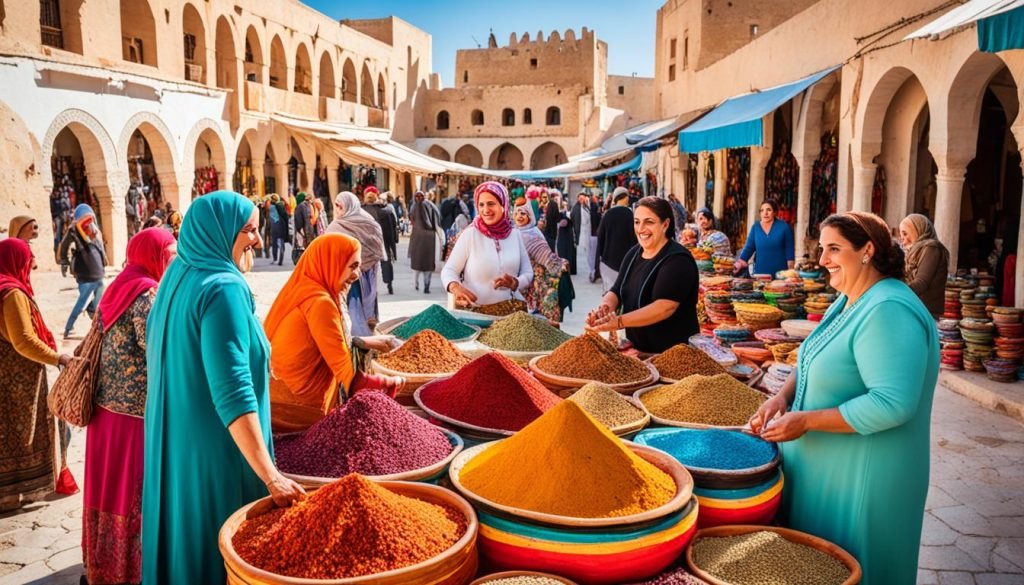
Ramadan and Other Festivals
Ramadan is a special time in Tunisia. The day changes a lot during it. Restaurants close in daylight but open at night. If you’re visiting, don’t eat or drink in public during daylight. It’s a sign of respect.
There are other festivals like Eid al-Fitr and Eid al-Adha. They also change daily life. Being part of these festivals helps you understand Tunisian culture better.
Best Places to Visit in Tunisia
Tunisia, a land of history, beautiful scenes, and deep culture, has much to offer. It is perfect for history lovers and adventure seekers alike. There’s something here for everyone.
Popular Tourist Destinations
A visit to Tunisia is incomplete without seeing Carthage. It tells of Phoenician and Roman times. Hammamet’s beaches offer sun and luxury, ideal for sea lovers.
In Sousse and Kairouan, the medinas take you back in time. They’re full of markets and history. Adventurers will love the Sahara’s sand dunes and Star Wars sets in the south.
Hidden Gems
Looking beyond the common places, you’ll find Tunisia’s hidden treasures. Dougga, a UNESCO site, presents North Africa’s stunning Roman ruins. It’s less known but worth visiting.
Matmata showcases unique Berber homes carved into the ground. Djerba offers beautiful beaches and vibrant culture for those seeking peace.
Exploring these hidden spots offers a real taste of Tunisia. It makes your trip both insightful and special.
How to Get Around Tunisia
Exploring Tunisia is a mix of old and new experiences. Knowing the best ways to travel can make your trip better. Tunisia transport has many options for getting around Tunisia.
Trains are a comfy way to see the sights. The SNCFT runs them across big cities like Tunis, Sousse, and Sfax. Buses are good for saving money. They are run by local and private companies.
For short trips, try louages (shared taxis). They are quick and go everywhere. For more freedom, renting a car is great. Just know the local driving rules.
A quick look at Tunisia transport:
| Mode of Transport | Ideal For | Pros | Cons |
|---|---|---|---|
| Trains | Long-distance travel | Comfortable, scenic, cost-effective | Limited routes in rural areas |
| Buses | Budget travel | Affordable, extensive coverage | May be crowded, fixed schedules |
| Louages | Shorter journeys | Flexible departure times, covers urban and rural | Depart only when full, fixed routes |
| Car rentals | Independent exploration | Total freedom, access to remote areas | Understanding of local driving rules needed |
Each transport option in Tunisia has its pros. You can pick based on your trip and what you like.
Conclusion
Getting ready for a trip to Tunisia is key for a great adventure. It’s smart to check the most recent travel news. Knowing about the travel rules early makes your arrival smooth.
Learning travel tips is a must. This includes how to handle money and what clothes to pack. Pick the best time to go and follow safety advice for a good trip. Being mindful of Tunisian customs, especially during festivals, helps you blend in.
Tunisia is full of amazing places, from famous spots to secret treasures. Plan to see both for an eye-opening trip. It’s easy to get around Tunisia with the right travel info. Being well-prepared and open to new things will make your trip unforgettable. You’ll enjoy Tunisia’s history, culture, and beauty.

